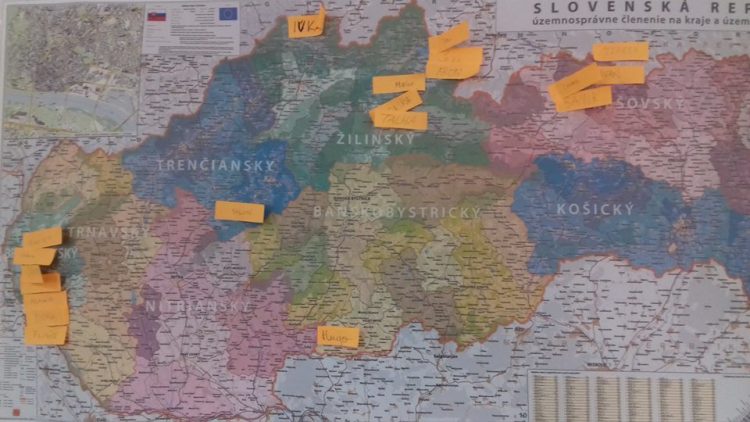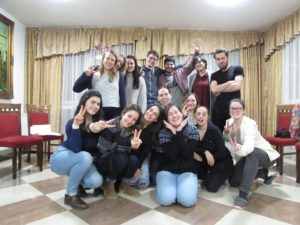Astronaut or polyglot, everything is possible
I have always studied lots of languages.
My mother wanted me to learn Chinese, German, even Arabic. And somewhere in the past, my protestations, my false arguments and my shrill voice still ring out. That voice of this age, this one, only thirteen years old. This voice that spoke a French SMS, stammered an English without accent, without envy, without English could we say. A passionate voice of poetry. Who reads, murmurs, sings, envies.
A voice that will soon be able to write.
A few years after this, I studied many languages, at school (which I quickly forgot). Chinese, Spanish, Latin, some Greek. I discover that language is fascinating, that language is alive, that it moves in multiple forms, that it is danced in songs, poems, films or even serenades. I discover language and I love it – an incredible exchange, a polyglot dialogue, a new passion.
I forget school languages and throw myself into the poetry of the world. I learn Icelandic and start dreaming in Esperanto. I translated poems, song lyrics, quotes, spells.
But this desire to speak to the world, words that become anthology,
this desire to write to each country what I know about it,
this desire to travel, not to flee, but to leave,
how far will it go?
Polyglot Gathering, Bratislava. From May 29 to June 2, 2019.
I am a volunteer, I am twenty years old, I am learning two languages and I can speak in English.
I would like to share with you this feeling of intense pride when we stick the sticker corresponding to the language we speak. French. English. Esperanto. I am looking for a little find the Icelandic flag. Hours of work, of incredible grammar, of incomprehensible poetry, of reading dictionaries, just here, on your name tag.
Then I get to walk between conversations and people. I hear unknown languages - sounds that run through the corridors and fill your heart with pride: you’re here in Bratislava, and you do not know what language to speak.
You are there, surrounded by thousands of hours of work – some will spend ten minutes finding all their stickers. They can speak 10 languages, can read them, understand them, use them but their smile will be more meaningful than the alphabet. You go out, discover them, exchange an English hello, how are you in Spanish, you give them the time in French and you will eat in sign language.
You are a part of your own story and the train that makes languages travel around the world – no barrier can stop the words.
I even exchanged some words in Slovak. And this guy looked at me, amused, happy, why did not you stick to the Slovak flag? it’s already a good start. I answer that I am not good enough, that it is not enough.
He told me that not enough does not mean anything and that not enough is already much more than I think.
The next day, I stick a new flag on my name tag. (on the A level, it’s my beginning)
Because every beginning is full of this type of not enough skills.
I have always studied languages. To be a polyglot. It has always sounded like a dream, like the feat that the intrepid people achieve. It’s like being an astronaut, it’s possible, but you, you can’t do it. It’s like dreaming during Latin lessons – no one speaks it anymore, so what’s the point? Well imagine, because I guess you do not know, that some people able to talk to each other thanks to this language that day.
Being polyglot – it’s not a goal but a destination. It’s a constant work – filled by a passion, a love of words and languages, of discovery. It is to travel without leaving, it is to deceive without being punished, it is to unite in silence to every human on earth who will know, like you, to attach oneself to the sounds of these people that we do not know yet.
From these few days, I know that they will not be the last. I met people from Tasmania, Russia, Australia, USA, people who visited France, Iceland, Montreal or China. I’ve talked with men, women, stories and lives.
To be a volunteer during this experience has allowed me to live both sides of this meeting. To be able to help, advise, guide people who, twice my age, consider me that day as one of theirs. Consider me with respect, almost expecting me to know more than they do. After all, these hours of work, these hours of language and discovery about ourselves and others, have they not taught us to be more humble?
Finally, what more can I say? There are few places in this world where so many people can feel at the good place at the same time. We start talking to anyone – to find out that they are like us. That passions are shared and that languages have never been barriers.
I think, on the contrary, that they are paths, exchanges, the best way to know each other, then to know ourself.
From each experience of my life, I am grateful, and accept that they may never happen again. But the advantage with Polyglot Gathering is that it happens every year.
So, see you to Poland next year because after all,
I will always study new languages.
This article was written by our EVS volunteer from France Léa Pillot-Colin.
 language, this article might be just for you. This time the E@I team in cooperation with other international partner organisations brings you
language, this article might be just for you. This time the E@I team in cooperation with other international partner organisations brings you 

